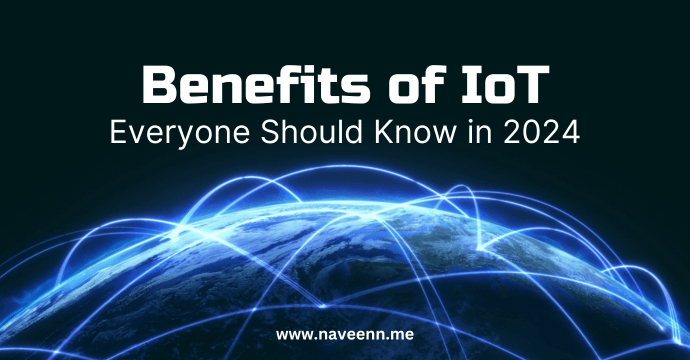In the swiftly changing realm of technology, the Internet of Things (IoT) has emerged as a transformative force, fundamentally altering our interactions with the world around us. As we delve deeper into 2024, the transformative impact of IoT continues to unfold, offering a plethora of benefits that touch every aspect of our lives.
In this blog post, we’ll explore some of the key advantages of IoT that everyone should be aware of in 2024.
What is IoT?
The term “Internet of Things” (IoT) denotes a system of interconnected devices furnished with sensors, software, and other components, facilitating data collection and exchange over the Internet. These devices encompass various everyday items, including household appliances, wearables, industrial machinery, as well as vehicles, buildings, and infrastructure.
IoT devices gather data from their surroundings through sensors and transmit it to other devices or cloud-based platforms for analysis and processing. This data can then be used to monitor, control, and optimize various processes, improve efficiency, enhance safety, and enable new applications and services.
The goal of IoT is to create a more connected and intelligent world, where devices can communicate, collaborate, and make autonomous decisions to improve productivity, convenience, and quality of life.
Read More: IoT App Development Real-World Impact Across Industries
7 Benefits of the Internet of Things(IoT)
Undoubtedly, the Internet of Things (IoT) has cemented its position as a permanent fixture rather than a fleeting trend. Therefore, our imperative is to maximize its potential while ensuring its security and maximizing its benefits. Some of the key benefits of IoT are as follows:
- Efficiency and Automation: IoT enables automation of various processes, leading to increased efficiency and productivity. Connected devices can perform tasks autonomously, optimize resource usage, and streamline operations in various sectors such as manufacturing, agriculture, and logistics.
- Improved Decision-Making: The Internet of Things generates vast amounts of data from sensors and devices, providing valuable insights for decision-making. This data-driven approach allows businesses to make informed decisions, identify trends, and predict outcomes, leading to better strategic planning and resource allocation.
- Enhanced Safety and Security: The Internet of Things technologies enhance safety and security by monitoring environments in real-time and detecting potential risks or hazards. Smart surveillance systems, wearable devices, and home automation systems can help prevent accidents, deter intruders, and respond quickly to emergencies.
- Cost Savings: By optimizing resource usage, reducing downtime, and minimizing waste, IoT can lead to significant cost savings for businesses and individuals. For example, predictive maintenance using IoT sensors can prevent equipment failures and reduce maintenance costs, while smart energy management systems can lower utility bills through efficient usage.
- Improved Health and Well-being: The Internet of Things plays a vital role in healthcare, enabling remote patient monitoring, personalized treatment plans, and early detection of health issues. Wearable devices, smart medical equipment, and telemedicine solutions empower individuals to take control of their health and receive timely medical care, leading to improved health outcomes.
- Environmental Sustainability: The Internet of Things contributes to environmental sustainability by optimizing resource usage and reducing environmental impact. Smart agriculture systems can monitor soil moisture levels and optimize irrigation, reducing water usage and minimizing environmental degradation. Similarly, smart energy grids can balance supply and demand, leading to more efficient energy distribution and reduced carbon emissions.
- Enhanced Quality of Life: The Internet of Things enhances the quality of life by enabling connected solutions that improve convenience, comfort, and accessibility. Smart homes equipped with IoT devices offer automated lighting, climate control, and security features, while smart cities leverage IoT to optimize transportation, reduce traffic congestion, and enhance urban living conditions.
The Internet of Things brings a multitude of benefits that span across various industries and sectors, driving innovation, efficiency, and sustainability in the digital age.
Conclusion
The benefits of IoT in 2024 are far-reaching and impactful, touching virtually every aspect of our lives. As Internet of things continues to evolve and mature, it holds the promise of driving even greater innovation, efficiency, and transformation across industries and societies. Embracing the potential of IoT is not just advantageous—it’s essential for staying competitive and thriving in the digital age.

Pingback: A Complete Guide to Develop a Binance Clone App
Pingback: Why does your Digital Marketing Strategy need to include AI?